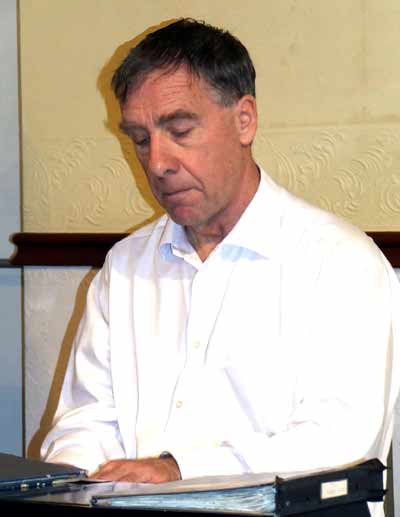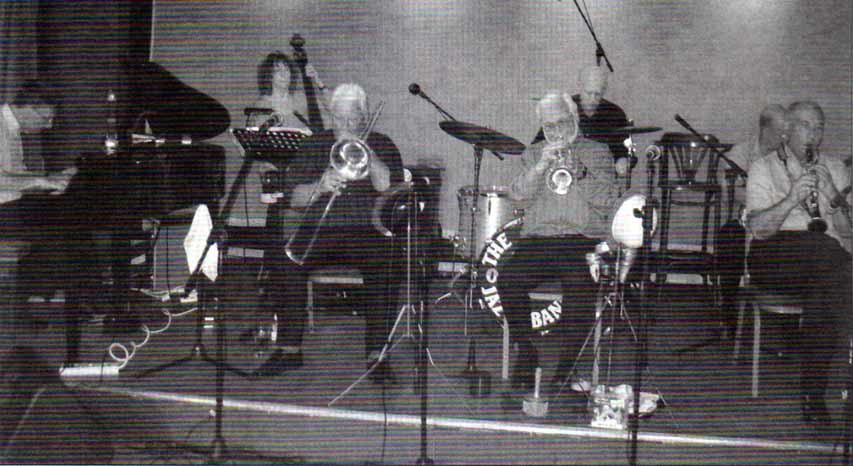|
Tom Culbert
Click here for Part 2
The big turning point in my life was at age fourteen, when I was at school in Edinburgh. I failed Grade 5 theory. (I suspect it may have been an error?) I decided that if I did not get more than 82% in the re-sit a few months later I would forget a music career and go for accountancy. I got 94%, so music it was! I loved studying Classical music at the Royal Manchester College of Music, but another door opened when I was twenty-one. I went to a party where they were playing Frankie Laine, Johnnie Ray and Elvis records which didn't appeal to me at all, but a Traditional jazz band with a banjo in it did. It turned out to be the Chris Barber Band with none other than Lonnie Donegan on banjo. I had never heard a jazz band with a banjo in it before, and I came very close to buying a banjo for myself. I then went to the Free Trade Hall, Manchester, to hear the Barber Band. I came away utterly astounded that these six musicians could play for two hours without any reference to sheet music and not make one ugly, discordant sound throughout. Next, I studied the 'New Orleans masters; such as King Oliver, Louis Armstrong's Hot Five (1926), as well as Jelly Roll Morton (pianist), and talented young white cornet player, Bix Beiderbecke. I noticed these bands featured piano and banjo, so pianist I was destined to be. I first joined a band aged twenty-six, and within two years I was 'catapulted' into a national broadcast with the Brian Green band. As it was live, after 11 pm it went out simultaneously on Radio I, 2 and 3. The Green band went to Heathrow Airport to welcome the great Louis Armstrong, and played Hello Dolly and Louis joined in the song with us. The Green band also did a national BBC broadcast with George Melly singing a couple of numbers with us. We had done a couple of London jazz club gigs with him previously. George asked me to play solo piano for him for a 'literary soiree' at his house, and it turned out to be a bizarre evening. I was greeted by a six foot male 'bunny girl' plastered in makeup. George was dressed in a Victorian lady's outfit. I was at a loss to understand why Mrs Melly was prepared to put up with this nonsense. On the London jazz club circuit we had the honour of Acker Bilk (clarinet) and Chris Barber (baritone horn) sitting in with us. Around this time I went to Paris and sat in with the High Society Jazz Band, led by trombonist Mowgli Jospin. Only recently I discovered he was the uncle of Lionel Jospin, ex-French president.
After getting married in London, in 1967, I joined the New Era Jazz Jazz Band and did a national BBC broadcast from the Roundhouse at Camden Town. Then, in 1970, the New Era appeared on 'Opportunity Knocks; with Hughie Green. We won the 'clapometer; and came second in the national vote. When he came off screen Hughie's sickly grin disappeared and he became normal and very professional. I found my only TV experience much less nerve wracking than the sound broadcasts, as we had to play one tune only, and we rehearsed it many times for camera and sound tests prior to the transmission. John Arthy, the New Era string bass and tuba player had been to Manchester and collected some sheet music published for dance bands of the 1920s and '30s. He formed the Pasadena Roof Orchestra, which went professional and became very famous after my move to Blackburn, in 1972. John knew I could read music, so when his young lady pianist left to embark on an opera career I joined on piano for four years. After five years semi retirement I joined a good local band from the Accrington area called the Riverside Jazzmen. During this time there was a great entrepreneur who not only brought top British musicians, but also Americans, to East Lancs. The Riverside were privileged to play with Pat Halcox (trumpet), John Crocker (clarinet) from the Chris Barber Band, Alex Welsh (trumpet), Fred Hunt (piano), Roy Williams (trombone), John Barnes (reeds), and Digby Fairweather (trumpet), who was voted BBC Jazz Musician of the Year. When the Riverside disbanded, three of us joined the Forest New Orleans Jazz Band, which currently plays at Nelson every Monday. Tom Culbert |
 My father was
a keen amateur pianist. He was also a very capable Fats Waller-style
pianist, having played in dance bands during his student days. When
I was four years old he organised classical chamber music sessions
with a local violinist and cellist - I used to sit and listen,
absolutely enthralled, and started piano lessons aged seven.
My father was
a keen amateur pianist. He was also a very capable Fats Waller-style
pianist, having played in dance bands during his student days. When
I was four years old he organised classical chamber music sessions
with a local violinist and cellist - I used to sit and listen,
absolutely enthralled, and started piano lessons aged seven.
